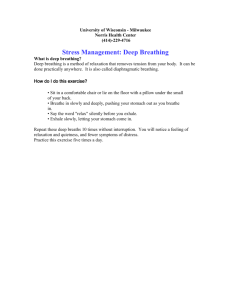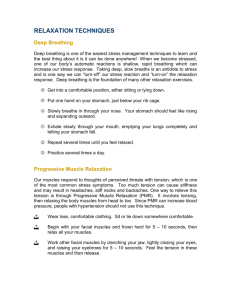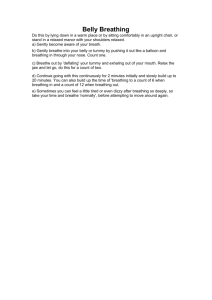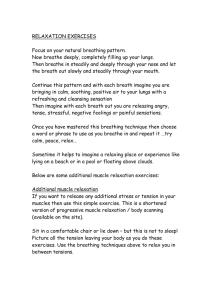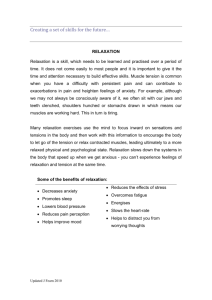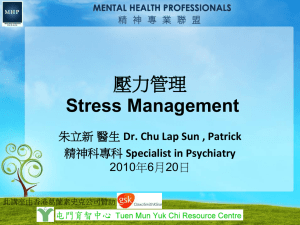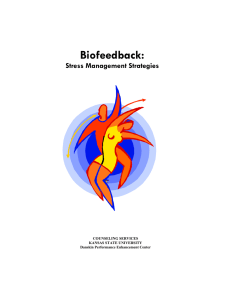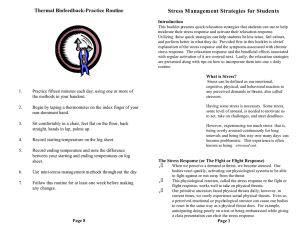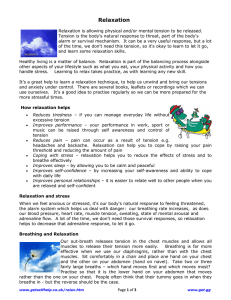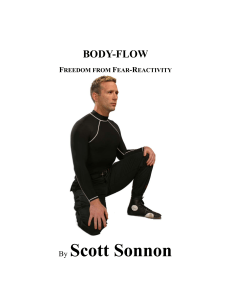Stress Management What is Stress?
advertisement
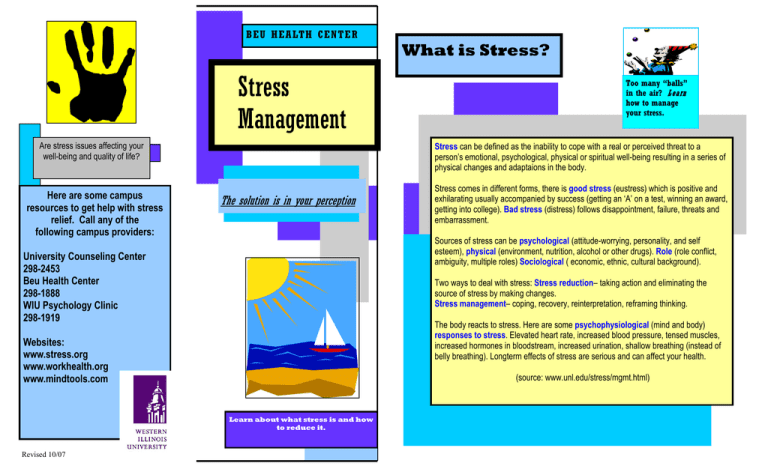
B E U H E A LT H C E N T E R Stress Management Are stress issues affecting your well-being and quality of life? Here are some campus resources to get help with stress relief. Call any of the following campus providers: Too many “balls” in the air? L ea rn how to manage your stress. Stress can be defined as the inability to cope with a real or perceived threat to a person’s emotional, psychological, physical or spiritual well-being resulting in a series of physical changes and adaptaions in the body. The solution is in your perception Stress comes in different forms, there is good stress (eustress) which is positive and exhilarating usually accompanied by success (getting an ‘A’ on a test, winning an award, getting into college). Bad stress (distress) follows disappointment, failure, threats and embarrassment. Sources of stress can be psychological (attitude-worrying, personality, and self esteem), physical (environment, nutrition, alcohol or other drugs). Role (role conflict, ambiguity, multiple roles) Sociological ( economic, ethnic, cultural background). University Counseling Center 298-2453 Beu Health Center 298-1888 WIU Psychology Clinic 298-1919 Two ways to deal with stress: Stress reduction– taking action and eliminating the source of stress by making changes. Stress management– coping, recovery, reinterpretation, reframing thinking. The body reacts to stress. Here are some psychophysiological (mind and body) responses to stress. Elevated heart rate, increased blood pressure, tensed muscles, increased hormones in bloodstream, increased urination, shallow breathing (instead of belly breathing). Longterm effects of stress are serious and can affect your health. Websites: www.stress.org www.workhealth.org www.mindtools.com (source: www.unl.edu/stress/mgmt.html) Learn about what stress is and how to reduce it. Revised 10/07 What is Stress? Stress Signs of Stress Physical: Sweaty palms Uneven or shallow breathingChange in sleep patternsUpset stomachTension headachesTension and muscle soreness in neck and shoulders Change in appetite Cold hands and feet Generally feeling unwell Emotional: IrritabilityAnxiousness or Why should I manage my stress? 4 methods of relaxation you can try: you are ‘stressed out’ you may be an Diaphramatic Breathing (belly breathing). (Breathing to expand the lungs fully and expel ‘stale’ air from the lungs) unpleasant person to be around, which can affect your relationships with friends and family. *Did you know that stress can affect your decision making? When your body is experiencing stress you tend to focus on the here and now. That means when you are making important decisions you aren’t considering future consequences. *Stress can also contribute to illness. Migraine cryingHostile behaviorLack of and tension headaches, ulcers, and colds can confidenceHelplessnessDecreased be caused by stress. Life threatening illnesses such as stroke, coronary heart disease, and Behavioral: Poor judgment hypertension can be attributed in part to the AbsenteeismInability to concentrateLoss amount of stress over time a person endures. of sense of humor Postponing difficult decisions Increased alcohol and other drug useIncreased smokingAccident Relaxation *Stress can affect you in many ways. When nervousnessEmotional outbursts and enthusiasmDepressionLack of motivation. Strategies to Tackle your *Not managing your stress can get in the way of your success. The good news is there proneovereatingacting are many methods to manage stress. impulsivelygrinding teeth Which ones work for you? Imagery (visualizing relaxing scenes, often in nature) Autogenic Training (a type of selfhypnosis that encourages the redirection of blood flow by imagining parts of your body feeling warm and heavy) Progressive Muscular Relaxation (tensing and relaxing muscle groups, and focusing on the relaxation of the muscles) If your mind can create stress it can also undo it. “mind over matter” “it’s all in your head” “ don’t worry be happy” Make yourself aware of stress: When you’re studying could you relax your forehead? Jaw? Shoulders? Back? Stomach? Legs? Tension is a sign of stress. Take a couple deep breaths that inflate your belly, keep your shoulders relaxed. Notice how this makes you feel. Stress Learn time managementfinding balance between school life, and social life will make you feel good about using your time well. Overcome procrastination– understanding how to get started on projects early will help you from experiencing that rushed last minute feeling. Find a support system- Everyone needs someone who will listen to them. Have at least one person you can count on-parent, sibling, friend, partner, advisor or counselor. Get enough sleep every night, eat a healthy diet and exercise daily.
